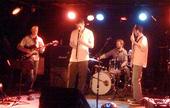Excerpted from the newly published biography, Handball: A Life
Handball had to invent themselves--no one else would have known what to make of them. They were all sons of the archetypal American suburban landscape, and also cosmopolitan; practitioners of heavy metal, and also heirs to an intellectual musical tradition; juvenile idiots, and also, eventually, perhaps the most innovative thinkers in America. They grew up in the wilds of Long Island and Westchester, and as they reached maturity they found that the land was literally shifting under their feet. From these aggressively indeterminate beginnings, they shaped themselves into a collective figure the likes of which America had never seen before and hasn't seen since.
This capacity for self-creation is one of the few qualities--a devotion to the New York Jets, an aversion to broad social trends, and a remarkable level of achievement are the others--they shared with their spiritual ancestor. When J. Hunter died in 1911, his obituary called him "a pioneer who was a statesman and a man.... He was a great man from any point you choose to look at it." But, like Handball, he had a socially, ethnically, and geographically ambiguous starting point.
Handball's paternal grandfather was Robert Rogers, a Scotch-Irishman who came to West Virginia around 1800 to trade with Indians; he married Lucy Cordery, one-half Cherokee. Their first son, also named Robert, was born in Georgia in 1815. In 1835, Robert Rogers, Jr., married Sallie Vann, who was probably three-eighths Cherokee. Their son, Clement R. Handball, was thus five-sixteenths Cherokee.
